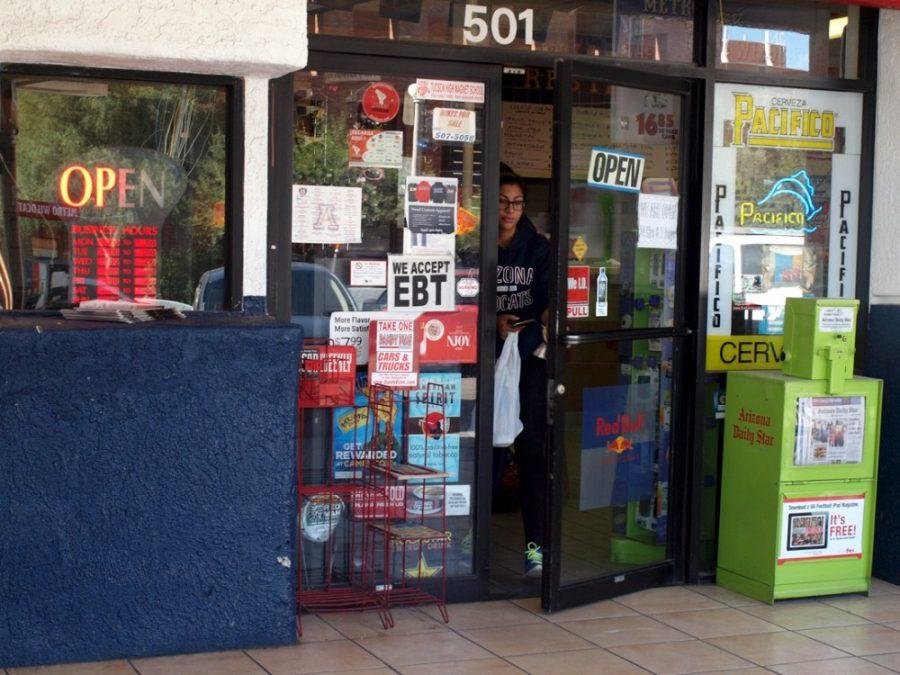Updated Oct. 19, 2015 at 8:00 p.m.
A former Metro Wildcat employee was arrested and released on Oct. 29 on charges of selling alcohol to underage students without demanding proper identification.
Shiva Thanet, a former employee at Metro Wildcat, had allegedly been continually selling alcohol to minors who did not have proper identification. This is not the first time Metro Wildcat has been under fire for not demanding proper identification from customers purchasing alcohol.
Metro Wildcat is a gas station and convenience store that sells a variety of food and drinks as well as beer, cigarettes and tobacco. It is located on Sixth Street and Park Avenue and open 24 hours a day, seven days a week.
Sudhir Newa, a Metro Wildcat employee, said the weekends are the busiest in regards to alcohol sales.
According to University of Arizona Police Department records, in mid-September, a UA student purchased a 30-pack of Pabst Blue Ribbon beer from Metro Wildcat without being asked for identification verifying he was of legal age to purchase alcohol.
The student identified the employee who carried out the transaction to be Jiten Darjee. When Darjee was questioned by a UAPD officer, he said he had not sold any alcohol throughout his shift, and that when he did sell alcohol, he recorded it in the store’s alcohol logbook that is verified by the Arizona Department of Liquor Licenses and Control.
UAPD looked at the logbook and noticed that the last log was from Aug. 29. Video surveillance from Metro Wildcat later proved that Darjee had sold the student the beer without logging it into the logbook and without asking for identification.
Darjee admitted to selling the beer to the student but said he did card him. This, however, could not be seen on the video due to the angle. Darjee was arrested for failure to ID by UAPD.
The most recent incident occurred on Oct. 29 when an officer was on duty outside of the Metro Wildcat and saw another UA student who appeared to be underage, purchasing beer from the store.
The UA student successfully purchased beer from Thanet without being asked for identification showing that he is of legal age to purchase and consume alcohol and without having the purchase recorded in the logbook.
The student then placed the beer into his backpack and left the store. Later, another officer made contact with him and verified that he was underage. The student told the officer he had not been asked to provide any identification in order to purchase the beer and pointed out Thanet as the clerk who had completed the transaction.
When the officer approached Thanet and asked him for the logbook, there was no record of his purchasing the beer. Thanet denied selling the student the alcohol but confirmed he was the only one working that day and was subsequently cited.
Newa said that since the incident, Thanet has been fired.
According to video footage from the store, Thanet was on the phone at the time of the transaction and was not paying attention to who was buying alcohol and did not ask for identification.
“We are strictly instructed to not sell liquor without ID,” Newa said. “We checked the video and he was on the phone. He made the mistake of not checking IDs and was fired.”
Newa said that since then, the business has purchased an IDVisor M310 Age Verification scanner because of the recent incidents and because it is a more efficient method for the business.
“This log in [book] is really very difficult,” Newa said. “When there’s [a] long line of customers, it takes a long time, and this is good for time-saving and at the same time verifying whether the ID is real or fake.”
According to IDscanner.com, the scanner, which runs for $1,195, reads magnetic strip IDs and 2D barcodes from all 50 states, including military and Canadian IDs.
Newa said protocol for checking IDs when people purchase alcohol is verifying the picture on the ID to the person and scanning the ID.
If the ID is fake, not of age or expired, the machine will say it is invalid and the alcohol will not be sold. The same protocol goes for tobacco purchases as well.
“If they are really old, like 50, 60, we don’t check it [because] some people get really crazy,” Newa said. “We can’t sell it if they say they forgot their ID, and if the machine rejects the ID, we cannot sell the product.”
_______________
Follow Adriana Espinosa on Twitter.









